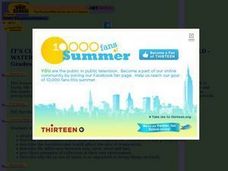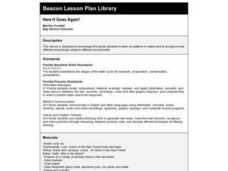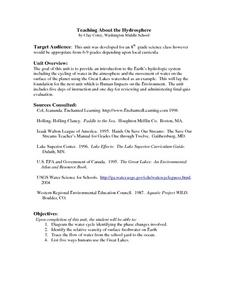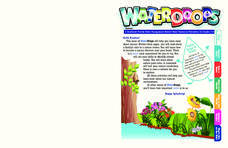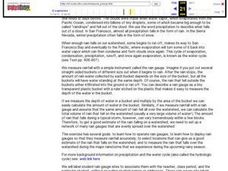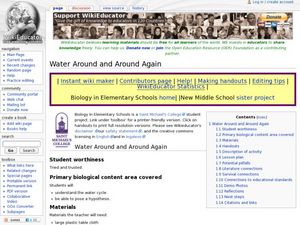Virginia Department of Education
The Hydrologic Cycle
There is the same amount of water on earth now as there was when it was formed. The water from your faucet could contain molecules that dinosaurs drank! Young scientists build their own hydrologic cycle model and observe it for five...
Scholastic
What Are Clouds Made Of?
Tiny bubbles, in my...clouds? Offer youngsters a hands-on, visual learning experience when reviewing the scientific concepts of condensation, water vapor, and the collection of droplets that make up clouds.
Discover Earth
Weather Stations
Transform your classroom into a fully functioning weather station with this series of hands-on investigations. Covering the topics of temperature, precipitation, wind patterns, and cloud formation, these activities engage young...
NASA
S’COOL Cloud Identification Chart
If you've ever wondered why clouds sometimes look so different, look no further than a classroom poster about cloud identification. It features pictures of clouds at high, mid, and low levels of altitude, as well as the name of each and...
Curated OER
Water World
Students explore the various steps of the water cycle. They identify the three steps in the water cycle and how they are related. Students describe three ways to conserve water. Students explore the origin of the water source that...
Curated OER
It's Clean, Fresh and only Three Billion Years Old - Water!
Students engage in a lesson plan which explores the wate cycle. They get to see some very entertaining video, do fun hands-on activities and gain a better understanding of evaporation, condensation, precipitation and collection.
Curated OER
Water Works Wonders
Students examine where water is found in the world, how we use it, and the various forms it takes. They observe the refraction of light through a prism, record the day and night sky over a week's time, and create a topographic model of...
Curated OER
Here It Goes Again!
First graders work on patterns in nature and to recognize how different living things adapt to different environments such as the rain forest.
Curated OER
Condensation
Students participate in the scientific process to investigate what happens to water when it evaporates by observing condensation. In small groups they observe what happens to ice in a cup, and what occurs when they hold a bowl of ice...
Curated OER
Hydrologic Cycle
In this science worksheet, students read about the Hydrologic Cycle. Students use the reading and a diagram to answer 2 comprehension questions.
Curated OER
Teaching About the Hydrosphere
Eighth graders are introduced to the Earth's hydrologic system including the cycling of water in the atmosphere and the movement of water on the surface of the planet using the Great Lakes watershed as an example.
Curated OER
A Study of Your Domestic Water Supply
Young scholars create a diagram that traces the path of a raindrop from its source into the water supply for their house and back to the environment. They also diagram the processes that occur in a sewage treatment and water treatment...
Curated OER
Make It Rain!
Students complete an experiment. In this precipitation activity, students complete an activity where they make rain in a jar.
Curated OER
Waterdrops
In this environment worksheet, students read an article about water drops and the nature center. They pretend that they are going to a nature center and write what they would hope see there. Students also identify living things and...
Curated OER
Science Videos
Students plan, practice, and act in a 2-3 minute videotaped production about a specific topic. Students from a local high school give presentations pertaining to seasons, earth rotation, and moon phases. Students analyze the...
Curated OER
Science: The Water Cycle
Students examine the various stages of the water cycle. In groups, they complete a hands-on activity by creating model water cycle. Students design posters representing each of the seven stages of the water cycle.
Curated OER
Rainfall Measurement
Students are introduced to rainfall measurement and develop a network of rain gauges. Students measure rainfall, plot rainfall maps and calculate total rainfall volumes during rainstorms.
Curated OER
Water as a Cycle
Students collaborate with a partner to create a large diagram containing one aspect of the water cycle. They are encouraged to include academic language and pictures for their presentation. Their is a peer evaluation sheet that is...
Curated OER
Water Quality
Students investigate the water cycle and evaporation. They study the porosity and permeability of groundwater, and the capillary action in soil in this unit.
Curated OER
Water Around and Around Again
Young scholars form a hypothesis for a water cycle experiment. In this water cycle lesson plan, students create their own environment with water and earth to study the water cycle. Young scholars complete a handout to make a hypothesis...
Curated OER
Water World Story
Fourth graders write a story about how a drop of water may have traveled to school. They design a presentation on the water cycle.
Curated OER
The Case of the Missing Water
Students examine the major concepts related to the water cycle in this lesson. They recognize and define evaporation, condensation, precipitation and the natural cycles that occur as weather. They also participate in an activity of...
Curated OER
It's So Sticky Outside That...
Young scholars examine the phases of the water cycle and water's different forms it can have. They work in groups to create pantomimes to illustrate the water cycle to their classmates.
Curated OER
Structure of the Earth System
Eighth graders describe the steps in the water cycle. They discuss factors that affect runoff and explain the differences between stalactites and stalagmites. They discover the importance of ground water.
Other popular searches
- Water Cycle Diagram
- The Water Cycle
- Water Cycle Experiment
- Water Cycle Activities
- Water Cycle Stages
- Water Cycle Crossword
- Water Cycle Lesson Plans
- Water Cycle Reader's Theater
- Water Cycle and Evaporation
- Water Cycle Diagram Label
- Water Cycle Simulation
- Build Your Own Water Cycle







